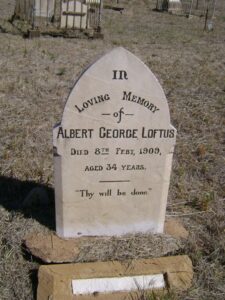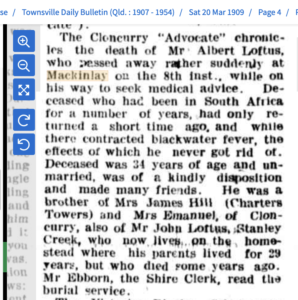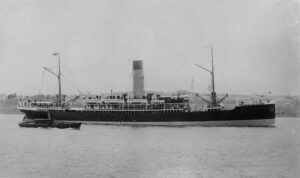An ordinary man.

Albert’s grave at Mackinlay. Authors collection.
I have always been interested in the “forgotten” people on my family tree, those who were single, or married but left no descendants and those who died young including the many unnamed infants. Those who led ordinary lives and left little behind in the way of possessions or stories to be remembered and passed down.
One such person was Albert George Loftus, the brother of my two times great-grandmother Alice Loftus. The Loftus family, John and Mary with their four surviving children, had arrived in Rockhampton, Queensland aboard the Landsborough in 1873.[1] Albert was born in Alma Street on 2 November 1876 and by the following year the family had moved to Stanley Creek on the Queensland Central Railway Line, where John was employed as a railway labourer.[2]
Albert attended schools in Rockhampton, 150 kilometres to the east, boarding with a married sister, and at Dingo, twelve kilometres from home. He joined the Queensland Central Railway, working as a Lengthsman in the Maintenance Section and as a Striker in the Locomotive Branch which took him back to Rockhampton.[3]
In his leisure time, Albert was a keen cricket player. During the 1900 season, he and his brother James played with the Fitzroys’ team. He was a competent bowler and batsman, frequently among the top scoring members of his team. The following year he played for the Railway team and was a member of the Railway social club which organised ‘in house’ competitions such as Married versus Singles matches.[4]
In 1901, Albert applied to join the Australian Defence Force and “General Order 705 of 16 October 1901…advised that recruit A G Loftus was inspected and passed by Captain P W G Pinnock at Rockhampton…and was taken on the strength of the B Company, 5th Regiment as Private No 153.”[5] The 5th Regiment, also known as the Port Curtis Regiment, was a part time Militia Infantry Regiment. After 1901 it entered the Commonwealth Service and no further records regarding Albert have been found.
Albert and his brother James disappear from Australian records in early 1902. During the week of 26 April, Albert played his last cricket match of the season in Rockhampton and after this date, for reasons unknown, the brothers departed for South Africa. I have found no record of Albert or James having served in the Boer War.
After their arrival, the brothers soon went their separate ways. In 1903, James married Mary Dorothy Lennon in Durban, Natal while Albert made his way to Barberton in the Transvaal.[6] Albert remained in South Africa until 1907, when having fallen on hard times, he applied to the Australian Commonwealth Government’s Repatriation Scheme for assistance to return home. This scheme had been set up for soldiers who had served in the Boer War or those who had emigrated to South Africa after the war.
At the time of his application, Albert was residing in Barberton and employed as an Asphalter.[7] He signed a Memorandum of Agreement stating that he had been granted a free steamer passage aboard the Cycle from Capetown to Brisbane and that when able, would refund the Government the cost of his passage which was £8. The Cycle arrived in Melbourne on 9 June 1907 and two days later, Albert and 70 other Queenslanders proceeded to Brisbane on the steamer Yongala.
After his return to Queensland, Albert did not return to Queensland Railways. Being obliged to repay his debt to the Australian Government, he searched for work, eventually finding his way to Mackinlay in Western Queensland in about January 1908. There Albert found employment as a labourer with the Mackinlay Shire Council.
In December 1908, Albert and Dick Williams were working at the Gilliat River on the Eddington Road, some 60 km north of Mackinlay, putting in two new crossings. They worked until about 3 February when Albert took ill. Hoping that his illness would wear off, he continued to work but a few days later reported feeling very bad and Dick advised him to “knock off” for the day. Dick suggested that Albert should ride in to town and take a train to Cloncurry to see a doctor but Albert said that he would “fight against it and work it off” adding that it was South African fever which he had contracted while living there. They returned to Mackinlay on about 9 February.
Over the next few days, Albert experienced several bouts of sickness. He stayed at the Union Hotel for several days, but getting no better and being unable to work, asked Jack McRae to take his place. He moved to a room at the back of Arthur Powne’s bulk store, where he was looked after by Mrs Stour.
Albert’s condition deteriorated over the next fortnight and on Friday 5 March said that he would go to Cloncurry on the coach. He asked Dick to bring his box of clothes to the store that night but when Dick returned, Albert said that he was feeling better and would not go.
The following morning, Dick asked Albert why he hadn’t taken the coach and Albert replied that he was feeling better and that he thought the trip would shake him up. He said that if he felt as fit on Monday, he would return to work. By dinner time he had taken another bad turn and was sorry that he hadn’t gone to Cloncurry.

Article about death of Albert Loftus on 8 March 1909 at Mackinlay, Q’ld.
On Sunday 7 March, Albert’s friends Jack McRae, Dick Williams, Charlie Burton and Alex Roxburgh sat with him at different times throughout the day then agreed to sit up all night. On Monday morning after breakfast, Alex asked him how he was feeling and Albert replied “Not too bad”. Alex went to the hotel to get Albert some milk then returned and fanned him with his hat. The temperature in Mackinlay at this time of the year soared into the mid- thirties and being nursed in a back room would not have been a comfortable experience.
Another friend came to sit with him but Albert sent him away saying that he only wanted Ginger (Alex) and Charlie to look after him. Albert died a short time later. Alex departed to inform the Justice of the Peace and Constable Stone, then Albert’s friends Jack and Dick. Constable Stone attended and took away Albert’s possessions which included £8, three horses, a saddle and clothing, a pack saddle and bags.[8]
Albert was buried at Mackinlay Cemetery on the day of his death, the service being read by Mr Ebborn, the Shire Clerk. It is possible that Albert’s sister Susannah, who was living in Cloncurry, attended but his other brothers and sisters were scattered across Queensland, England and New Zealand and would probably not have heard of his death for some time.
As there had been no doctor in attendance, a Magisterial Enquiry was held. Constable Stone reported that Albert passed away quietly at about 9am on 8 March 1909, probably as the result of the fever from which he had previously suffered.
Albert died at the age of 34 years, without having made a will. After his debts were paid, the value of his estate was assessed at £33 10 8.[9]
I began my research on Albert Loftus with a date of birth and a date of death. There was no marriage and there were no descendants and I wondered if any more could be discovered. In researching Albert’s life, I discovered new sets of records in both Australia and South Africa, which in turn led to some significant progress not only in my research on Albert but also his brother. Albert was an ordinary man but his story reminds me yet again that every person has a story to tell.
[1] Queensland State Archives. Landsborough passenger list, Item ID 18476, P8.
[2] Queensland Registry of Births, Deaths and Marriages, Birth Certificate, Albert George Loftus, 1876/C/4314.
[3] Appointments of Queensland Railway Employees, 1890-1915.
[4] Morning Bulletin (Rockhampton, QLD, :1878-1954), 4 February, 1902, p.7.
[5] Correspondence with Colonial Forces Study Group, 11 October 2016.
[6] FamilySearch, South Africa, Natal Province Civil Marriages, 1845-1955, James John Loftus and Mary Dorothy Lennon.
[7] National Archives of Australia, Repatriated Australians.
[8] Queensland State Archives, Inquest 286/09, Item id JUS/N422, Film 92468, Albert George Loftus.
[9] Ancestry, Australia, Queensland Government Gazettes 1903-1910, 1909. Albert George Beer Loftus.


Linda thank you for your story of Albert Loftus. It is a timely reminder that we all have these forgotten family members whose lives were short and left no descendants. They do indeed have a story to tell. You have shown that with diligent research we can uncover so much of their lives and share their stories
Hi Rosemary,
Thank you for your comments. I was fortunate with Albert. There are others in my family where I have only discovered a few basic references and little to flesh out their stories.
What a fascinating story, Linda. You did really well to start with merely a birth and death date and then find so much more ‘hidden’ in newspapers and further records. A very interesting read. My father’s only sibling, Thelma, never married and had a few tragic events in her life. Her father and aunt never approved of any of her boyfriends and I believe she died a rather lonely person. Perhaps I can follow your lead so she, too, can be remembered?
Hi Ross,
Thank you for your feedback on Albert’s story. We are fortunate if we can find anyone who knew our subject for those personal details not found in official sources. Albert’s inquest provided eye-witness accounts of his final days and words. I hope that you can find such witnesses to Thelma’s story and that they can provide different perspectives on her life.